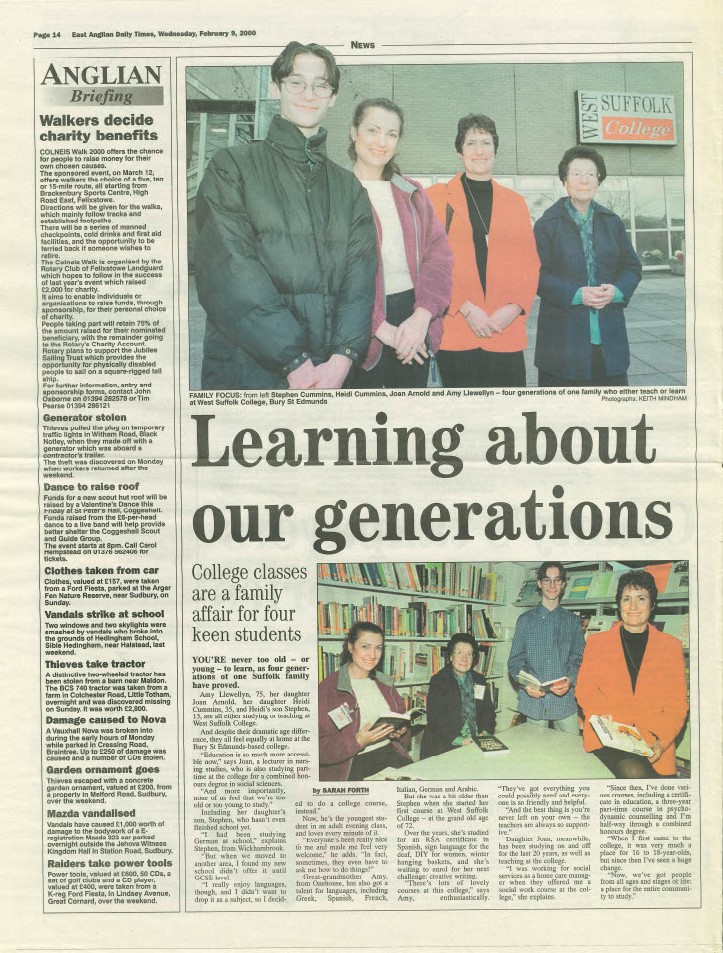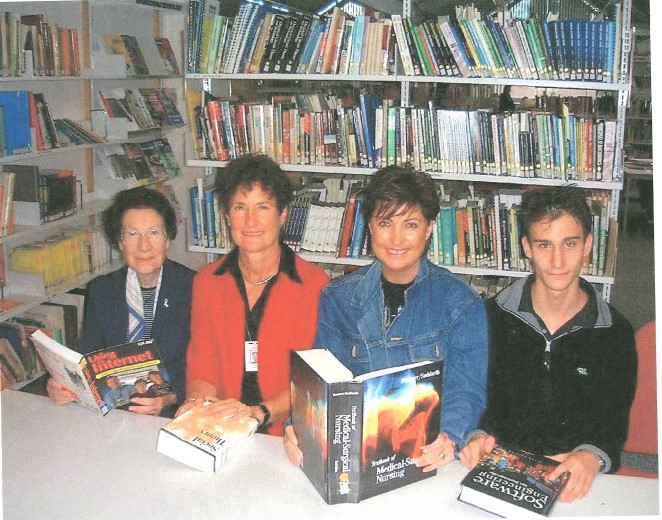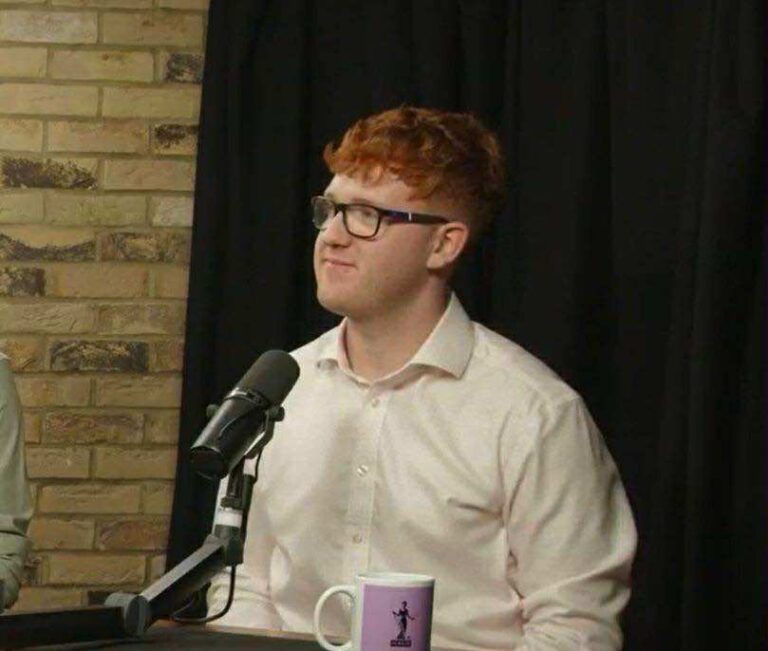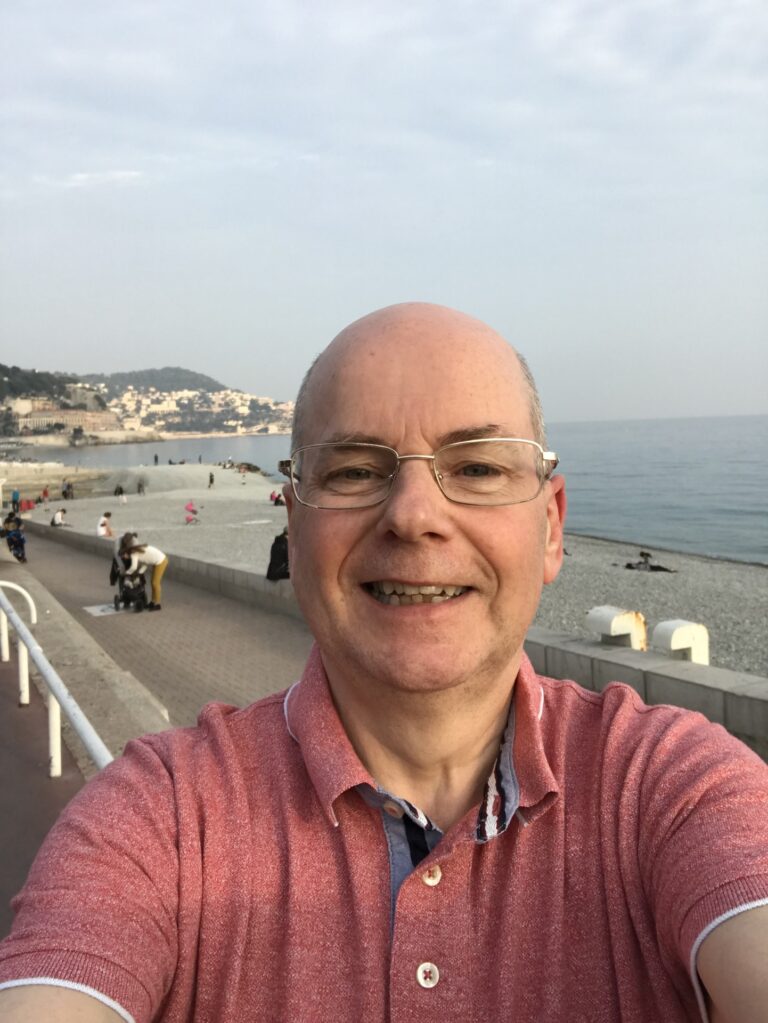Joan Llewellyn (was Arnold) worked for West Suffolk College for 30 years, 20 as a lecturer and another 10 as a work placement officer – all in the department of Health & Social Care and Early Years. Starting in 1991, she is proud of her student successes, indeed one of her former students eventually replaced her. She recalls the many student residential trips, both UK and international, that she organised, having introduced them to her department.
When did you join Eastern Education Group?
I started in 1991 as a lecturer and course director in Health & Social Care and Early Years in both Further and Higher education. I became Senior Tutor for the last five years of my full-time role. I introduced residential courses in my department, taking students on ‘outward bound’ type experiences. When I gave up lecturing full-time after twenty years, I continued planning and organising work placements and assessing students for a further ten years.
My previous job was in the local Social Services department for ten years. This real-life experience was invaluable to my teaching role. I worked alongside four principals in my career at the college: John Shipston, Nick Foster, Ann Williams (now Ruthven) and the current principal, Dr. Nikos Savvas. When I started teaching, most of my classes were delivered in a prefab building at the rear of the campus. This building was shared with a day nursery for the under-fives. Australia house had recently been opened. This was a far cry from the extensive campus of today.
Do you have any special memories from your time with us?
The first concerns a group of mature students who completed the two-year Level 3 professional childcare qualification in just one year. This was a fantastic achievement. In addition to submitting all their assessments, students carried out 850 hours of work placement, often working at weekends and juggling family commitments. I recall saying to the group that one of them would take over from me when I gave up teaching full time. That person is Teresa Evans (who did!).
Another special memory was getting a group of my level 3 students accepted into higher education. This was the first time that qualification was recognised as entry to university.
I took the students away on a week residential soon after joining the college, and every following year. The trips to Weardale, Co Durham and later in the Ardeche region in France gave students the opportunity to extend their skills in many ways and enhance their CV. They took part in problem solving and team building activities including canoeing, river crossing using ropes and harnesses, rock climbing and abseiling, raft building, high rope work and zip wire. To encourage them I felt it was important to take part in all the activities that the students were expected to undertake.
I also took a group of 10 students to Romania to visit orphanages, hospitals and residential homes for the elderly, soon after the fall of the Communist regime. We travelled overland in a minibus with a trailer for our belongings, essential supplies and gifts. This was a huge culture shock for the group of Health & Social Care students from Suffolk. Witnessing extreme poverty was a first for most of them, as was seeing soldiers with machine guns on street corners. The electricity and water were only on for brief periods in the residential homes, making care of the elderly extremely challenging. The supermarkets had very limited items for sale: biscuits, bottled fruit and vegetables and cans of fizzy drink. We would have discarded most of the produce that was for sale at the market. One day I bought enough bananas for our group, only to be advised by the sales assistant to wrap them to prevent them from being stolen from me. Locals would buy just one egg at a time. Many European countries had sent aid and a crate of oranges sent to an orphanage rotted as the Romanians didn’t know they had to be peeled.
When I started at WSC there were no student support services in place. I was called upon many times to offer counselling to students and occasionally to staff, as I had a counselling qualification. I also developed and delivered introductory counselling courses and introduction to Bereavement & Loss to staff as twilight sessions and night classes.
Are there any family members who have connections to EEG?
Between 2002 and 2004 four generations of my family were attending WSC. I was lecturing, my mother was taking a basic computing course and various night classes, my daughter was studying psychology and my grandson, Stephen, studied German which wasn’t available at the school he attended. Stephen graduated from Durham University with a Ph.D. in computer software engineering aged 22. He took a job at WSC lecturing in computer science and one of his students achieved a First in his degree. This was also a first for the college in that qualification. Stephen has gone on to bigger and better things and is a fellow at Cambridge University among various other roles.

What did you go onto to do after College?
Since leaving WSC in 2021, I volunteer in my local community shop, work hard at keeping fit and travel when I can. I have visited every continent, most recently travelling to Japan.
Is there a message you would like to share as we celebrate our 100 years of history?
It was great to work as part of an excellent team and see how my students have progressed and achieved in their careers and lives. I often bump into ex-students when I am in Bury St Edmunds.
Lastly, do you have any advice for future students and staff at EEG?
This is an excellent stepping board for your future.




